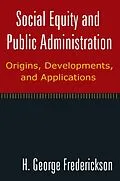This book is designed to be the definitive statement on social equity theory and practice in public administration. Social equity is often referred to as the "third pillar" in PA, after efficiency and economy. It concerns itself with the fairness of the organization, its management, and its delivery of public services. H. George Frederickson is widely recognized as the originator of the concept and the person most associated with its development and application. The book's introduction and chapters 1-4 offer general descriptions of social equity in terms of its arguments and claims in changing political, economic, and social circumstances, and trace the development of the concept over the past forty years. Chapters 5-9 provide applications of social equity theory to particular policy arenas such as education, or to specific public administration issues such as the range of administrative discretion, the legal context, the research challenges, and social equity in the context of time and generations. Chapters 10 and 11 describe the current state of social equity and look towards the future.
Autorentext
H. George Frederickson
Inhalt
Chapter 1 Social Equity and the New Public Administration; Chapter 2 Social Equity in Context; Chapter 3 Social Equity; Chapter 4 Social Equity and the Question of Administrative Discretion; Chapter 5 The State of Social Equity in American Public Administration; Chapter 6 An Intergenerational Social Equity Ethic; Chapter 7 Social Equity, Law, and Research; Chapter 8 When Education Quality Speaks, Education Equality Answers; Chapter 9 Social Equity in the Twenty-First Century; Chapter 10 Conclusions;
